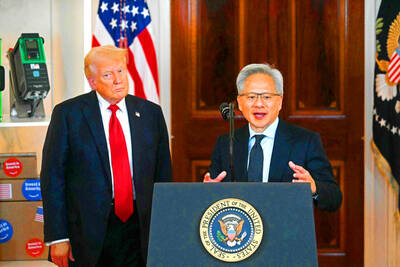Italy made an “improvised and atrocious” decision when it joined China’s Belt and Road Initiative (BRI) four years ago, as it did little to boost exports, Italian Minister of Defense Guido Crosetto said in an interview published yesterday.
Italy signed up to the BRI under a previous government, becoming the only major Western country to have taken such a step. Crosetto is part of an administration that is considering how to break free of the agreement.
The BRI scheme envisions rebuilding the old Silk Road to connect China with Asia, Europe and beyond with large infrastructure spending. Critics see it as a tool for China to spread its geopolitical and economic influence.

Photo: EPA-EFE
“The decision to join the [new] Silk Road was an improvised and atrocious act” that multiplied China’s exports to Italy, but did not have the same effect on Italian exports to China, Crosetto told the Corriere della Sera newspaper.
“The issue today is: how to walk back [from the BRI] without damaging relations [with Beijing]. Because it is true that China is a competitor, but it is also a partner,” the defense minister added.
After a White House meeting with US President Joe Biden on Thursday, Italian Prime Minister Giorgia Meloni said her government had until December to make a decision on the BRI, and also announced she would soon travel to Beijing.
In an interview on Saturday with the TG5 Italian news program, Meloni said it was a “paradox” that even if Italy is part of the BRI, it is not the G7 country with the strongest trading links to China.
“This shows that you can have good relations and trading partnerships” even outside of the BRI, she added.
The deal was signed in 2019 under the administration of former prime minister Giuseppe Conte, drawing criticism from Washington and Brussels, and Italy is highly unlikely to renew it when it expires early next year.

Taiwan Semiconductor Manufacturing Co (TSMC, 台積電) last week recorded an increase in the number of shareholders to the highest in almost eight months, despite its share price falling 3.38 percent from the previous week, Taiwan Stock Exchange data released on Saturday showed. As of Friday, TSMC had 1.88 million shareholders, the most since the week of April 25 and an increase of 31,870 from the previous week, the data showed. The number of shareholders jumped despite a drop of NT$50 (US$1.59), or 3.38 percent, in TSMC’s share price from a week earlier to NT$1,430, as investors took profits from their earlier gains

AI TALENT: No financial details were released about the deal, in which top Groq executives, including its CEO, would join Nvidia to help advance the technology Nvidia Corp has agreed to a licensing deal with artificial intelligence (AI) start-up Groq, furthering its investments in companies connected to the AI boom and gaining the right to add a new type of technology to its products. The world’s largest publicly traded company has paid for the right to use Groq’s technology and is to integrate its chip design into future products. Some of the start-up’s executives are leaving to join Nvidia to help with that effort, the companies said. Groq would continue as an independent company with a new chief executive, it said on Wednesday in a post on its Web

CHINA RIVAL: The chips are positioned to compete with Nvidia’s Hopper and Blackwell products and would enable clusters connecting more than 100,000 chips Moore Threads Technology Co (摩爾線程) introduced a new generation of chips aimed at reducing artificial intelligence (AI) developers’ dependence on Nvidia Corp’s hardware, just weeks after pulling off one of the most successful Chinese initial public offerings (IPOs) in years. “These products will significantly enhance world-class computing speed and capabilities that all developers aspire to,” Moore Threads CEO Zhang Jianzhong (張建中), a former Nvidia executive, said on Saturday at a company event in Beijing. “We hope they can meet the needs of more developers in China so that you no longer need to wait for advanced foreign products.” Chinese chipmakers are in

POLICY REVERSAL: The decision to allow sales of Nvidia’s H200 chips to China came after years of tightening controls and has drawn objections among some Republicans US House Republicans are calling for arms-sale-style congressional oversight of artificial intelligence (AI) chip exports as US President Donald Trump’s administration moves to approve licenses for Nvidia Corp to ship its H200 processor to China. US Representative Brian Mast, the Republican chairman of the US House Committee on Foreign Affairs, which oversees export controls, on Friday introduced a bill dubbed the AI Overwatch Act that would require the US Congress to be notified of AI chips sales to adversaries. Any processors equal to or higher in capabilities than Nvidia’s H20 would be subject to oversight, the draft bill says. Lawmakers would have